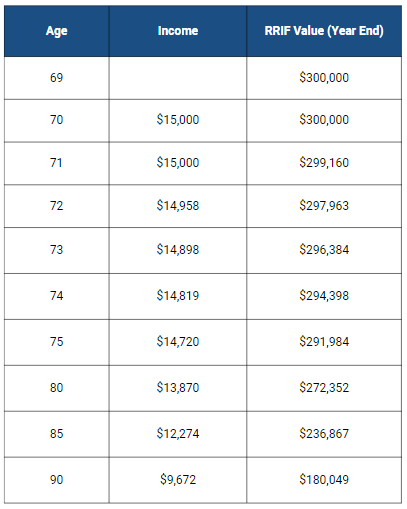How Much Do You Need to Retire?
Some studies have shown that perhaps we worry too much about our funds in retirement. One expert estimated that a couple could live on around $44,000 per year. 2 Government safety nets could supplement this amount if personal assets were exhausted. Many of us would dispute this assessment, as most would like retirement to go beyond subsistence! If you are fortunate enough to have a defined benefit pension plan at work, you will have at least some idea of your retirement income. However, the world continues to change and defined benefit pension plans have become increasingly rare. Registered Retirement Savings Plans (RRSPs) are the other major component of retirement savings for many Canadians. They are often converted to a Registered Retirement Income Fund (RRIF) to provide taxable income. How much can a RRIF provide? For those who are regimented in contributing, the RRIF may play a substantial role. The table shows the payments that would be received based on the current minimum withdrawal requirements for a plan value of $300,000 at age 70. Assuming a five percent annual return on investments, changes in the RRIF value are also shown. For those worried about outliving assets, the numbers may provide some comfort. At age 90, 60 percent of the original asset value is still available, and this doesn’t consider other sources of retirement income that may be available.
How Much Can the RRIF Provide?
Example: Payments Received Based on Minimum Withdrawal Requirements for Plan Value of $300,000 at Age 70 Assumes Five Percent Compounded Annual Return

The RRIF is flexible in the amount of income you can draw, so some may withdraw more than the minimum when needed. The Tax-Free Savings Plan has also become a significant investment vehicle that can help to fund retirement. And in many cases, people do not stop working at age 65. While they may leave lifelong jobs, they may end up doing something else that is productive (and perhaps even profitable!). For those concerned about longevity risk, the Canada Pension Plan (CPP) has the potential for greater payouts if payments are deferred to the age of 70. The current maximum annual benefit is $16,375.203 for an individual who starts payments at age 65, but this rises by 42 percent at age 70. Yet, fewer than one percent of retirees delay CPP until age 70, despite studies that show it to be one of the more financially prudent decisions should you live beyond the average life expectancy of 82 years old. We Are Here to Assist One of our roles is to help clients prepare for a comfortable retirement. We can assist with worksheets and tools to project your requirements as you plan for the future. Start calculating your retirement potential today: My RazorPlan
2. https://www.thestar.com/business/personal-finance/do-you-want-a-budget-middle-class-or-deluxe-retirement-i-ve-calculated-exactly-what/article_7f9c740e-3828-5d13-a907-b2202c55b6ff.html ; 3. Based on maximum monthly payment amount at the start of 2024 of $1,364.60 Canada Pension Plan - How much could you receive - Canada.ca
Echelon Wealth Partners Inc.
The opinions expressed in this report are the opinions of the author and readers should not assume they reflect the opinions or recommendations of Echelon Wealth Partners Inc. or its affiliates. Assumptions, opinions and estimates constitute the author's judgment as of the date of this material and are subject to change without notice. We do not warrant the completeness or accuracy of this material, and it should not be relied upon as such. Before acting on any recommendation, you should consider whether it is suitable for your particular circumstances and, if necessary, seek professional advice. Past performance is not indicative of future results. The comments contained herein are general in nature and are not intended to be, nor should be construed to be, legal or tax advice to any particular individual. Accordingly, individuals should consult their own legal or tax advisors for advice with respect to the tax consequences to them.
Share this post









